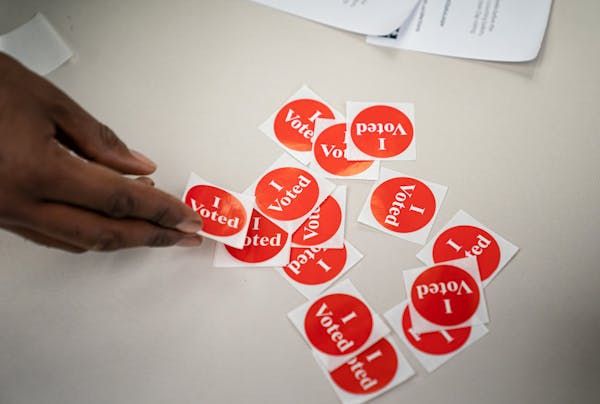The polls are closed as a historic chance to weigh in on the future of policing in the wake of George Floyd's killing drove voters in Minnesota's largest city to vote on Tuesday, leading the questions at stake as residents of Minneapolis, St. Paul and other communities cast ballots in municipal elections.
"I think we need drastic change," Jared Mogen said after voting in favor of Question 2, a ballot measure that would clear the way for the city to replace the Minneapolis Police Department with a Department of Public Safety. "Piecemeal reform efforts are not enough."
Mogen voted at Holy Trinity Church, just around the corner from the former site of the department's Third Precinct, which burned in the days after Floyd's death in May 2020. Mogen, a 29-year-old Costco worker, said the days of unrest were on his mind as he weighed his vote in recent days.
Polls closed around the state at 8 p.m., with those waiting in line at the time able to cast their ballots.
Earlier, at Sabathani Community Center, just down the street from the intersection where Floyd died in custody of a group of officers, David Hyatt said he didn't particularly trust local police — but not enough to vote for Question 2.
"I don't think it's feasible to get rid of police with nothing to replace them," Hyatt said. He He said he sees a city descending into lawlessness, and he thinks it could get worse.
Minneapolis voters were also voting for mayor, all 13 City Council seats, the Park Board and the Board of Estimate & Taxation. They are also deciding two other ballot measures, on how power is divided in City Hall and whether to limit rent increases.
Record early voting turnout
Minneapolis City Clerk Casey Carl said Tuesday afternoon that an estimated 39,406 voters had participated at city polling places as of noon. When combined with absentee balloting, about 27% of the city's voting population had so far participated in this year's election. Early voting is projected to be up 140% over the last municipal election in 2017, and Carl said it's the largest early voting turnout in 45 years.
Despite the various races for the city's elected slots, many voters made it clear Question 2 was top of mind and their main reason for voting. Voting at Holy Trinity, Wynn Wever, who voted no, said it was the only part of the ballot he filled out.
"I like the police. We need the police," said Wever, 79, a retired roofer and resident of Trinity Apartments next door.
Views on the Minneapolis mayoral race also seemed to be heavily influenced by the public safety debate.
Using the city's ranked-choice voting system, Mogen ranked his choices for mayor as Sheila Nezhad, AJ Awed and Kate Knuth. He said Mayor Jacob Frey did not impress him last year and that Nezhad's "values align with mine strongly."
The Rev. Joe Gillespie of St. Albert the Great Catholic Church, a block north of Lake Street, voted for the measure to replace MPD, although he said he knows many great Third Precinct officers. During the riots, he said, "We knew what it was like to feel abandoned. Reformation of the department could help address that."
Gillespie voted for Frey for mayor and didn't rank anyone else. "Jacob Frey is someone I've worked with before," said Gillespie. "Anyone caught in those extreme circumstances would be challenged. I feel he deserves another chance."
Near George Floyd Square
Voters headed into Sabathani Community Center, down the street from George Floyd Square, at a steady clip. Sabathani chief operating officer Ken Rance, who voted Tuesday in the 5th Ward on the North Side, said he is against Question 2.
"I don't know any Black folks talking about defunding the police," said Rance. "When you talk about Yes on 2, what is the plan? I think I'm some ways it was a knee jerk reaction."
Rance said he supports Minneapolis Police Chief Medaria Arradondo and would like to see state law changed to give police unions less power and chiefs more leeway to fire problem officers.
Amber Matsen, a 30-year-old wedding/event planner, said she voted in favor of Measure 2. "I'm for change, and I hope Minneapolis is the city that can propel our nation forward."
Matsen said she and her husband bought a house near George Floyd Square after his killing last year. "We want to raise our family around culture and diversity. We were living in a mostly white neighborhood." As a white woman, Matsen said, "I can only say so much about this."
Matsen voted for Kate Knuth for mayor and didn't rank others. Frey, she said, "did not convince me he deserves another chance."
During a Tuesday morning media availability, JaNae' Bates, spokeswoman for Yes 4 Minneapolis, the political committee that wrote the policing proposal, said regardless of Tuesday's outcome, the group's push will continue.
"If the people of Minneapolis vote no [on Question 2], that does mean that the disinformation campaign has won out for this battle. And it means that this fight continues," said Bates. "We will most certainly continue moving forward."
Divided on policing amendment
At Roosevelt High School, Kevin Nelson said Question 2 was the most important issue to him. Nelson, a self-employed woodworker, said calls to "defund the police" sounded like a good idea in the volatile times after George Floyd's murder.
But as time went by and details were few, he turned against the idea. "You're voting for whatever they want to do," he said. "It's kind of like giving them a free pass."
In the East Phillips neighborhood, residents Dave Moore and Linnea Hadaway were strongly in favor of Question 2.
"The police have to be held more accountable than they are," Moore said. "It's got to change and the people have to change it."
"They've been talking about police reform for 25 years and absolutely nothing has changed," Hadaway said. "And that's why I'm willing to take the risk."
Voting on mayor and rent control in capital city
In St. Paul, voters are electing a mayor and school board members, and deciding on an ordinance that would limit rent increases to 3% a year.
At Hancock-Hamline in St. Paul's Midway area, voter Deborah Howze said she thinks Mayor Melvin Carter is doing a great job.
"That's my man. I mean, that's not my man like that. But I like what he does," Howze said. "Plus he's our first black mayor. OK, it's not just because of that, but I like the things he has done."
At the Jimmy Lee Recreation Center, Nadia Sandstrom said the rent control question was the biggest issue to her, and she strongly favors the question. With rents for a one-bedroom apartment in many new buildings hitting $2,000 a month or more, she said she was voting to make St. Paul a more livable city.
"I would really love to make St. Paul the place where no matter what walk of life you come from, you can afford to live here and actually set down roots," Sandstrom said.
In the mayor's race, Sandstrom said that while "I like Melvin Carter, I'd like something new." Her choice, she said, is Dora Jones-Robinson.
"I like the idea of a woman of color becoming mayor," she said. "I also like that she's a clear activist and she clearly fights for her people."
Julie Schuett and her family have owned their St. Paul home in the Summit-University for many years. She said while she can "see both sides of the issue" when it comes to rent control, she voted no.
"It just feels too extreme," Schuett said, adding that she thinks rent control measures in other cities — such as New York – have made overall housing less affordable.
Schuett said her family knows the Carter family well. She voted for Mayor Melvin Carter, she said, in part because she values stability in times of upheaval and because he has done as well as can be expected during a pandemic and racial reckoning.
"It's such an unprecedented time," she said. "I don't really feel it's time to make a change."
Another St. Paul resident, Elizabeth Ellis, said she remains angry over the city instituting organized trash collection a few years ago. While that issue is not on the ballot this year, she said her "no" vote on the rent control question comes from a similar place – she doesn't think people should be forced to toe some government-mandated line.
"We're already giving too much control to government," Ellis said. "If they weren't asking us, they would just do it anyway. So if you're going to ask me, I'm saying no."
The fact that the folks against the measure – large developers and rental property owners – mailed her enough fliers "that I could wallpaper my kitchen with them" almost made her think twice in opposing the question, she said. "But they're not limiting anything else to three percent."
Voters in Highland Park
At the Temple of Aaron, you don't have to convince Wolfie Browender that St. Paul has an affordable housing crisis. But limiting rent increases to 3% a year, with no exemptions or adjustments, is not the way to address the problem, he said.
"I think it's way too restrictive. Everything I've read says it's maybe the most restrictive [rent control measure] in the country," Browender said. "There is no doubt there is an affordable housing shortage in St. Paul. But in my opinion, this is not the way to address it."
When asked about St. Paul Mayor Melvin Carter, Browender just shrugged.
"I think Mayor Carter has been OK. But I've been disappointed in how he's worked with the police chief and I think that's part of the reason Chief Axtell announced last week that he's not going to try for a second term," Browender said. "I think that's a huge loss. I think Chief Axtell has done a really good job of balancing the issues of crime in St. Paul with properly policing so as not to target people based on how they look, skin color, things like that."
Does he think Axtell's stepping down will have an effect on Carter being re-elected?
"I think Mayor Carter is going to get re-elected without very much trouble. He has done enough that is ok, good, so that enough people will support him," Browender said. "I'm ambivalent."
More than 180 cities and school districts across the state are holding elections Tuesday. You can track the results here.
Staff writers Kelly Smith and Stephen Montemayor contributed to this report.

Want to share info with the Star Tribune? How to do it securely

A Minnesota field guide to snow shovels: Which one's best?
Sign up for Star Tribune newsletters

